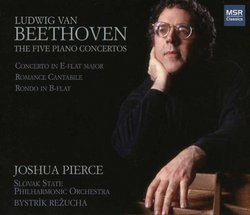Product DescriptionThe Beethoven that looms so large on our musical landscape is Beethoven the Composer. It was Beethoven, after all, who defined the modern idea of who and what a composer is. But the 22-year-old young man who arrived in Vienna in 1792 was about to make a slightly different reputation in the salons of that music-loving city. Beethoven was a keyboard player and he was about to stake his claim to be the best pianist in town. This was no mean feat in a city that was said to have had 300 pianists-in-residence and thousands of piano students, many of them the offspring of the best families. Favorite pianists were like prizefighters or rappers. Each man had his patrons and followers and Beethoven often had to defend his title in pianistic matches or duels that were held regularly in the houses of the aristocracy. What did Beethoven sound like? The first thing we have to realize is that the piano of Beethoven?s day ? we would call it a fortepiano ? was a much lighter instrument than the modern concert grand and the virtuosi of the late eighteenth century affected a refined and elegant style that worked very well on these instruments. Beethoven, on the other hand, pushed the fortepiano to its very limits. His playing struck his contemporaries with its power and its brilliance as well its emotional resonance. In fact, Beethoven?s style triggered the development of more rugged and more powerful instruments, an evolution that started in his own lifetime and which eventually led to the modern grand piano. But there is something else. When we think of Beethoven the pianist we have to put out of our minds the traditional image of the classical pianist playing revered old music to a hushed and reverent public. The music Beethoven played was contemporary music. Most of it was his own music and, as far as we can tell, much of it was made up on the spot. In short, Beethoven, like a jazz pianist, made himself famous by improvising new music in the homes of the Viennese nobility where he was a welcome guest. Many of these aristocrats became his patrons, supporters and even friends and their names are liberally sprinkled as dedicatees throughout the title pages of his publications: Prince Karl Lichnowsky, Princess Christiane Lichnowsky, Count Johann Georg von Browne-Camus, Prince Franz Joseph Lobkowitz, Archduke Rudolph, Count Andreas Razumofsky, Count Moritz Fries, Baron Gottfried van Swieten, Count Waldstein, the Brunsvicks and the Brentanos. Indeed, no composer before or after ever! had such a list of princely supporters as did this strange, swarthy, prowling, difficult, improvising maestro of the keyboard.


 Track Listings (8) - Disc #1
Track Listings (8) - Disc #1